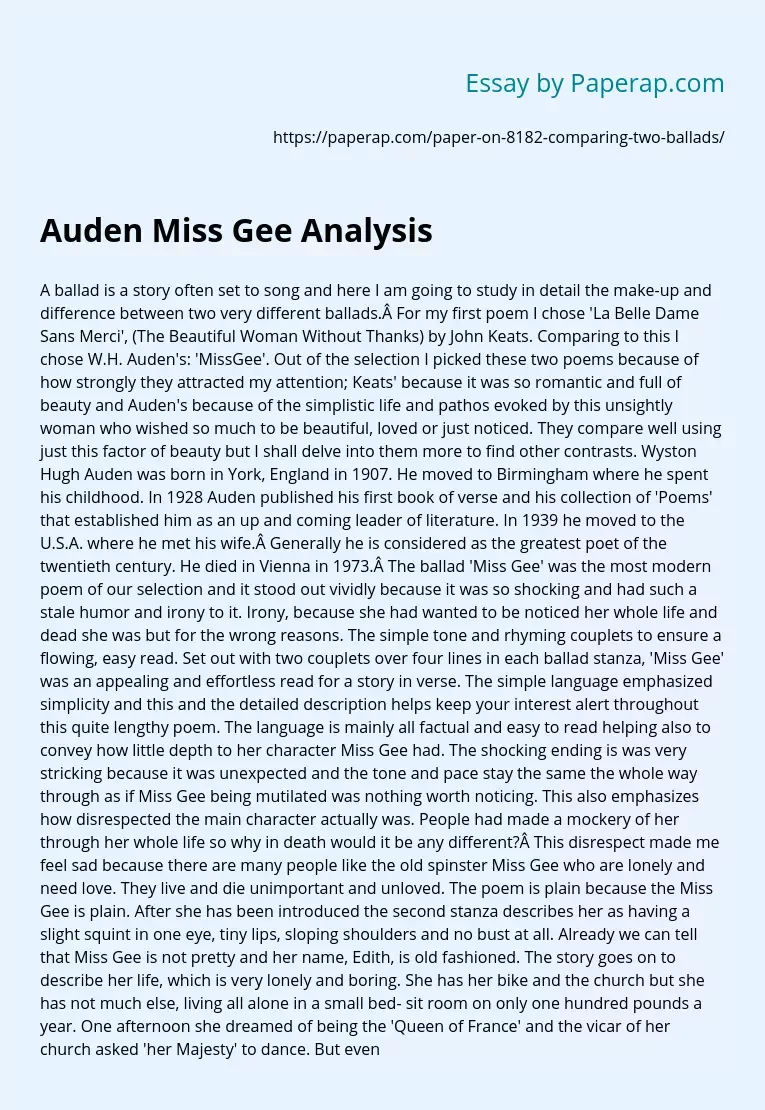Auden Miss Gee Analysis
A ballad is a story often set to song and here I am going to study in detail the make-up and difference between two very different ballads. For my first poem I chose ‘La Belle Dame Sans Merci’, (The Beautiful Woman Without Thanks) by John Keats. Comparing to this I chose W.H. Auden’s: ‘MissGee’. Out of the selection I picked these two poems because of how strongly they attracted my attention; Keats’ because it was so romantic and full of beauty and Auden’s because of the simplistic life and pathos evoked by this unsightly woman who wished so much to be beautiful, loved or just noticed.
They compare well using just this factor of beauty but I shall delve into them more to find other contrasts.
Wyston Hugh Auden was born in York, England in 1907. He moved to Birmingham where he spent his childhood. In 1928 Auden published his first book of verse and his collection of ‘Poems’ that established him as an up and coming leader of literature.
In 1939 he moved to the U.S.A. where he met his wife. Generally he is considered as the greatest poet of the twentieth century. He died in Vienna in 1973. The ballad ‘Miss Gee’ was the most modern poem of our selection and it stood out vividly because it was so shocking and had such a stale humor and irony to it. Irony, because she had wanted to be noticed her whole life and dead she was but for the wrong reasons.
The simple tone and rhyming couplets to ensure a flowing, easy read. Set out with two couplets over four lines in each ballad stanza, ‘Miss Gee’ was an appealing and effortless read for a story in verse. The simple language emphasized simplicity and this and the detailed description helps keep your interest alert throughout this quite lengthy poem. The language is mainly all factual and easy to read helping also to convey how little depth to her character Miss Gee had.
The shocking ending is was very stricking because it was unexpected and the tone and pace stay the same the whole way through as if Miss Gee being mutilated was nothing worth noticing. This also emphasizes how disrespected the main character actually was. People had made a mockery of her through her whole life so why in death would it be any different? This disrespect made me feel sad because there are many people like the old spinster Miss Gee who are lonely and need love. They live and die unimportant and unloved.
The poem is plain because the Miss Gee is plain. After she has been introduced the second stanza describes her as having a slight squint in one eye, tiny lips, sloping shoulders and no bust at all. Already we can tell that Miss Gee is not pretty and her name, Edith, is old fashioned. The story goes on to describe her life, which is very lonely and boring. She has her bike and the church but she has not much else, living all alone in a small bed- sit room on only one hundred pounds a year.
One afternoon she dreamed of being the ‘Queen of France’ and the vicar of her church asked ‘her Majesty’ to dance. But even her beautiful dream was ruined; just like her self- esteem and anything she would ever dream to have. She ‘buttoned her clothes up to her neck’ because the years had made her insecure and staid. The repetition of certain lines emphasizes just how monotonous her life actually was. She turned her head away from the passing young couples because she hurt to think of what she didn’t have. ‘They didn’t ask her to stay’. Here I feel I strong feeling of sympathy towards Miss Gee because she is so lonely.
She attended church regularly yet she sat in the side aisle as if she wasn’t good enough or she maybe felt too ugly. Saying ‘lead me not into temptation, but make me a good girl please…’ The church is her only source of friendship, comfort. She knows she has a friend in God. Yet, here she still lacks confidence, and sitting in the periphery shows that even in church she feels like she doesn’t fit in. Miss Gee is a ‘good girl’ but I think she thinks that if she is ‘good’ she will maybe fit in. She says ‘lead me not into temptation’ because she feels guilt for not being thankful for who she is and for wishing someone like the vicar would love her.
When she got sick the doctor commented that ‘cancer is a funny thing, childless women get it and men when they retire, and it’s as if there had to be some outlet for their foiled creative fire.’ He meant that it was as if people who had not fulfilled what they wanted or they had an inability to do so, got cancer. Miss Gee died and the teacher took her to be examined by students who laughed disrespectfully at her. Constantly she was an outsider, unusual, yet even in death she was not given any respect. Then they shipped her off to the anatomy department where they hung her up and ‘carefully dissected her knee’. This demeaning tone is shocking and so very sad. It sums up Miss Gee’s whole life.
Auden Miss Gee Analysis. (2017, Nov 06). Retrieved from https://paperap.com/paper-on-8182-comparing-two-ballads/

